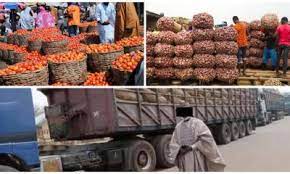Food crisis looms between June and October – Meteorologists warn

Weather experts have warned that over 50 million people in West Africa and the Sahel region may experience a food crisis between June and October.
The representative of AGRHYMET, Dr. Abdou Ali while attributing the likely food crisis to insecurity, poor food production, and late outset of rainfall, said the crisis could be addressed if countries in the region change their food production system, reports The Nation.
He disclosed this in Abuja today, Monday, April 22, during the seasonal forecasting workshop for agro-hydro-climatic characteristics of the rainy season for the Sahelian and Sudanian zones of West Africa and the Sahel (PRESASS 2024).
He said: “We have many problems in the region, insecurity, bad food production and we are currently not in the rainy seasons.
“We however have a tool that assesses the number of people under food crisis. According to the analysis by the Permanent Interstate Committee for Drought Control in the Sahel (CILSS) and its partners, a very large number of people would be in a food crisis in the region from June to October if appropriate measures were not taken.
“We have made an assessment and for this year, we have a very big number of people that would be affected compared to last year where about 37 million people were affected in the region.
“This year, more than 50 million people will be in food crisis in the region during the upcoming lean season from June to October if appropriate measures are not taken to manage the situations.”
On the way forward, Ali said: “Each country needs to mobilise funds, activate contingency plans, call for assistance from partners and also provide food where necessary to manage the crisis.
“There is a need to increase the food-producing system because most of the current systems rely on rainfall and currently, the rainfalls are very bad. So, we need to change the paradigm to something that would be resilient to climate variability and climate change.”
To curtail the likely food crisis, the Director General of the Nigerian Meteorological Agency (NiMet), Prof. Charles Anosike said the agency has commenced disseminating the seasonal rainfall predictions to stakeholders via social media, television and radio platforms.
He said adherence to early warnings would prevent loss of resources, especially by farmers.
“Weather and climate events continue to exact a toll on our region despite the tremendous advances and investments in climate science and operational forecasting over the past century.
“Weather-related hazards, including early/late onset of rainy seasons, chronic events such as droughts and floods and extended periods of extreme temperatures trigger and account for a great proportion of disaster losses.”
To reduce loss, Prof. Anosike said: “We are disseminating via social media, BBC, FRCN, and national television and we are also disseminating through our partnership with the United Nations, IFAD, Ministry of Agric. So, we are doing a lot to make sure that farmers get the information.
“Currently, in many parts of Nigeria, we are still waiting for the onset of rainfall, so this is the appropriate time to inform farmers and others because a lot of them are beginning to rush to plant but we are trying to get to them so that they don’t rush and lose resources.”
He expressed hope that the impact of the flooding and other disasters would be mitigated this year if Nigerians adhere to the warning.
“We are informing Nigerians early to know what to do to address the issues and we hope that adherence will mitigate the impact of flooding and other disasters. So, we encourage our citizens to heed the warning because it is real.”
The World Meteorological Organization Representative, Dr. Roland Abah also said the impact of climate change poses a huge threat to development in the region.
He said the World Economic Forum in 2024 ranked extreme weather as the highest current risk facing the global economy.
Abah stated that extreme weather is expected to remain the highest risk over the next 10 years.
He said: “The year 2023 was confirmed by WMO as the warmest on record and the past nine years, 2015 to 2023, were the warmest on record.
“This warming trend has continued in 2024 from January to March and we are all witnesses to the dynamics of temperature and humidity parameters in West Africa and the Sahel.”
Abah said $ 8.5 billion was lost in Africa in 2022 due to weather-related disasters.
“The State of Climate in Africa Report 2022, revealed that more than 110 million people on the African continent were directly affected by weather, climate, and water-related hazards in 2022, causing more than $8.5 billion in economic damages.”




